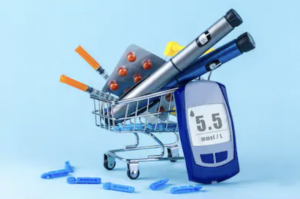Diabetes Care and Emergency Kit Tips
 The prevalence of diabetes as an underlying health condition in recent Louisiana COVID-19 death rates is alarming. If you have kept up with the Centers for Disease Control and Prevention (CDC) guidance on individuals at higher risk for COVID-19 complications, you know that people with diabetes are among the affected groups.
The prevalence of diabetes as an underlying health condition in recent Louisiana COVID-19 death rates is alarming. If you have kept up with the Centers for Disease Control and Prevention (CDC) guidance on individuals at higher risk for COVID-19 complications, you know that people with diabetes are among the affected groups.
According to the American Diabetes Association (ADA), having the disease does not increase your risk of contracting COVID-19, it makes you more susceptible to serious illness or death caused by complications of the virus. It does not matter whether you have Type 1 or Type 2 diabetes. Type 1 diabetes occurs when your body no longer produces insulin to regulate blood glucose levels. Type 2 diabetes occurs when your body does not use insulin properly, it either resists the effects of insulin or does not produce enough to maintain normal glucose levels.
The World Health Organization (WHO) indicates that coronaviruses are a large family of viruses that cause diseases including the common cold and also more severe acute respiratory illnesses. The CDC offers guidelines for everyone to follow, whether you have a pre-existing or underlying condition or not. In regard to diabetes care, here are a few Carmichael’s tips we’ve compiled for current and future Retail Pharmacy customers who have diabetes:
- Keep diabetes equipment and treatment supplies clean. It is important to bathe regularly and wash your hands thoroughly before administering insulin or other injectable medications.
- Safely dispose of needles, and do not share needles or insulin pens.
- Keep your prescriptions filled and stock up on extra supplies through Carmichael’s convenient pharmacy services.
- Know that certain over-the-counter (OTC) medications such as decongestants can affect blood glucose levels. Always read product labels and ask your healthcare provider if you are not sure about the effects of an OTC medication.
- Watch for symptoms of diabetic ketoacidosis (DKA), a potentially life-threatening condition that develops when the body uses fat as fuel when it does not have insulin. This results in a buildup of acids in the bloodstream known as ketones.
- Maintain a healthy lifestyle with adequate exercise, diet and sleep.
Emergency Kit Essentials
A life-threatening diabetes emergency can happen anytime, anywhere – which is why it is important to have an emergency bag that is easily accessible. You do not need to anticipate when an emergency will happen, but you should be prepared.
Create an easy-to-grab emergency kit and label it. Have at least a three-day supply of extra diabetes medication and supplies. Your kit should contain your contact information, food, medications, testing supplies, water, and a source of glucose. The following additional tips may help you in the event you find yourself in a diabetes emergency:
- Wear a diabetes bracelet. If you suddenly lose consciousness or cannot speak, it is important that first responders or bystanders be aware that you have diabetes. A medical ID bracelet can help medical personnel appropriately and quickly treat you. Your ID clearly indicates that you have diabetes and includes other vital information for medical treatment.
- Have a brief list of your personal medical history on hand for medical personnel to access. It should contain your health conditions, medications and dosages and allergies. The name and phone number of your physician, pharmacy, and emergency contact person should also be included. Put copies in your smartphone and wallet and in a visible spot in your home.
- If a diabetes emergency is caused by blood sugar levels that are too low, a fast-acting supply of glucose will help raise them quickly. Include glucose tablets and gels in your emergency bag and a glucagon injection kit on hand in case low blood sugar causes seizures or unconsciousness.
- Keep a visible list of the signs and symptoms of hypoglycemia in your home and at work. Help your family, friends and co-workers know how to properly administer glucagon.
- Keep your extra insulin cold at home and a supply of clean, unexpired blood glucose testing strips. Store unused insulin bottles, cartridges and pens in the refrigerator between 36°F and 46°F until the expiration date listed on the insulin.
- Never let your insulin freeze; do not use it if it freezes or after it thaws. Keep insulin cartridges and pens you use at a room temperature between 56°F and 80°F, away from heat and light.
- If you are traveling through an airport, the US Department of Transportation and Security Administration allows you to carry certain medications in a carry-on case on your flight.
- Keep a few days’ worth of extra bottled water at home in the event of a weather emergency or some other declared disaster or pandemic. High blood sugar levels can cause dehydration. The CDC recommends planning for one gallon of water per person, per day, when storing extra water at home.
- A quick snack that contains glucose or simple carbohydrates can prevent your blood sugar levels from dropping too low. Purchase non-perishable foods recommended by the ADA or your healthcare provider.
Consider also purchasing an insulin pump for diabetes management. The pump rapidly delivers insulin through a catheter in continuous doses throughout the day, and it does not have to be used only for emergencies. Some models can monitor your blood sugar levels too. According to the ADA, if you do not have access to other diabetes medications and supplies while stuck somewhere for several hours, having an insulin pump on hand can help stabilize your blood sugar levels until the emergency ends.
Carmichael’s Retail Pharmacy is a one-stop shop for walk-in sales of prescription diabetes medications and complementary products. Carmichael’s Compounding Pharmacy can compound custom prescribed medications to meet the individual needs of patients who have diabetes. Pharmacists ensure that each compounded prescription is prepared in the precise amount, strength and dosage.
We offer additional ways to refill prescriptions. Our interactive voice response (IVR) system is available for requests for any non-emergency prescriptions and refills past our normal hours of operation. You can refill online and, on the Carmichael’s, “RxLocal” app that can be downloaded on Android and iPhone mobile devices. We can ship certain home medical products directly to your residence from our in-house UPS station within one to three business days.
If you need supportive footwear, our selection of Orthofeet shoes, the top recommended footwear by podiatrists, in athletic, casual, and dress styles can benefit you. We have a Certified Therapeutic Shoe Fitter on staff to assist customers with proper shoes selection. Some diabetic or therapeutic shoes require a prescription and have to be custom made. Contact or visit our Crowley location for more information and to find out how much of the costs your insurance will cover.




 Accredited/Certified by The Joint Commission
Accredited/Certified by The Joint Commission